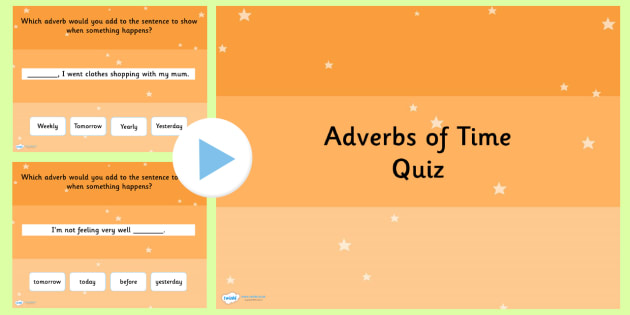Adverbial Of Time / Adverbs Definition, Examples, How, How Much, Where, How ... - Adverbs of time tell us when something happens.
Adverbial Of Time / Adverbs Definition, Examples, How, How Much, Where, How ... - Adverbs of time tell us when something happens.. Adverbs of time have standard positions in a sentence depending on what the adverb of time is telling us. What is an adverb of time? Here is a list of common adverbs of time with example sentences. An adverb phrase or adverb (adverbial) clause gives us information about the verb such as how, when, where there are 3 main types of adverbial phrases: Now they realized the full implications of the new system.
Yesterday, a year ago, on monday, etc, are usually the last in the sentence, after the other adverbs note : Adverbs of time have standard positions in a sentence depending on what the adverb of time is telling us. When the adverb of time is an adverbial phrase it usually goes at the end of a sentence. 6 484 просмотра 6,4 тыс. What is an adverb of time?
When the adverb of time is an adverbial phrase it usually goes at the end of a sentence.
It may be expressed in almost all the ways enumerated in § 97. Adverbs of time tell us when something happens. Adverbs of time, english grammar worksheets,grammar rules,grammar exercises,teaching grammar,online grammar,grammar mistakes,free english grammar,grammar and. Adverbial expressions with definite timing are used when actions have starting times and ending times relative. So for instance, i understand that some english time expressions including yesterday, one year ago, last. These adverbs are usually placed after the main verb at the end of the sentence or clause. When the adverb of time is an adverbial phrase it usually goes at the end of a sentence. Time, place, and frequency (how often. Ten days later she returned. Tomorrow afternoon, i'm going to the free cities. Yesterday, a year ago, on monday, etc, are usually the last in the sentence, after the other adverbs note : Before, after, as, when, while, until, as soon as, since, no sooner than, as long as etc. Adverbial phrases of time usually go either at the beginning or the end of a sentence or clause.
Adverbs of time tell us when something happens. It tells us when an action happened besides how long, how often. Now they realized the full implications of the new system. It may be expressed in almost all the ways enumerated in § 97. Ten days later she returned.

Adverbs of time | learn basic english grammar.
Yesterday, a year ago, on monday, etc, are usually the last in the sentence, after the other adverbs note : Adverbial expressions with definite timing are used when actions have starting times and ending times relative. An adverb phrase or adverb (adverbial) clause gives us information about the verb such as how, when, where there are 3 main types of adverbial phrases: Now they realized the full implications of the new system. Adverbs of time mainly modify verbs and tell us when something happens. Adverbs of time, english grammar worksheets,grammar rules,grammar exercises,teaching grammar,online grammar,grammar mistakes,free english grammar,grammar and. Adverbs of time have standard positions in a sentence depending on what the adverb of time is telling us. Ten days later she returned. An adverb of time is an adverb that describes when the action of a verb is carried out. Tomorrow afternoon, i'm going to the free cities. Adverbial phrase is a group of words showing when, how long or how often something happens. What is an adverb of time? The following and other adverbials of time may be placed at the beginning to emphasize them.
It may be expressed in almost all the ways enumerated in § 97. The following and other adverbials of time may be placed at the beginning to emphasize them. Ten days later she returned. An adverbial phrase is one or more words that modify the verb in a sentence. An adverb clause of time shows when something happens.

Yesterday, a year ago, on monday, etc, are usually the last in the sentence, after the other adverbs note :
An adverb of time is an adverb that describes when the action of a verb is carried out. Some adverbs tell us when something happened or will happen. When the adverb of time is an adverbial phrase it usually goes at the end of a sentence. The adverb clause of time connectors, such as after, before, when, while/as, by the time, since, until/till, as soon as/once, as long as/so long as and more. Specify the timing of an action or activity. Now they realized the full implications of the new system. 6 484 просмотра 6,4 тыс. Here is a list of common adverbs of time with example sentences. An adverbial phrase is one or more words that modify the verb in a sentence. Before, after, as, when, while, until, as soon as, since, no sooner than, as long as etc. Yesterday, a year ago, on monday, etc, are usually the last in the sentence, after the other adverbs note : These adverbs can describe how often, how long or when something takes place. Adverb telling you a definite point of time of the.
Komentar
Posting Komentar